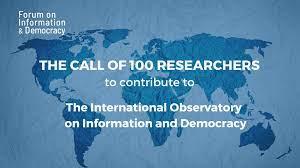
https://informationdemocracy.org/2023/05/17/world-telecommunications-and...
According to the Reuters Institute’s Digital News Report 2022, between 32 and 82% of people, depending on the country, use social networks for information. The latest datareportal study reports that 4.7 billion people use social networks, which corresponds to over 75% of the world’s population.
At the same time, many studies suggest that the widespread use of digital media may be correlated with democratic decline. A 2022 report from the Varieties of Democracy Institute (V-Dem), found that “liberal democracies peaked in 2012 with 42 countries and are now at their lowest level in over 25 years.” The report also notes that “toxic polarization”-signaled by the decline in “respect for counter-arguments and associated aspects of the deliberative component of democracy”-has worsened in at least 32 countries.
For a structural response within a multilateral framework, 50 democratic states signed the Partnership for Information and Democracy. At a ministerial-level summit in New York in September 2022, the civil society-led implementation body, the Information and Democracy Forum, announced the forthcoming creation of the International Observatory on Information and Demcoracy, which is intended to become the equivalent of the IPCC for global warming for information chaos.
The prefiguration committee, chaired by Angel Gurria, former secretary general of the OECD, and Shoshana Zuboff, author of The Age of Surveillance Capitalism, has associated personalities such as Maria Ressa, Nobel Peace Prize laureate, and Jim Balsillie, founder of Blackberry and the Centre for International Governance Innovation (CIGI). This Observatory will aggregate global research to provide decision makers with a synthesis of knowledge.
For the World Information Society Day, 100 personalities from the research world call “on democratic countries, technology companies, the research community and civil society to cooperate with the Observatory on Information and Democracy”. This is urgent because “this decade is crucial to affirm that technology must live in the house of democracy and not the other way around”. It is necessary “that the research carried out throughout the world be translated into timely and relevant public policies”. The signatories come from all continents.
The call of the 100 corresponds to two needs: first, the need for a synthesis of global research, which is abundant but whose mass does not always allow for clear conclusions; second, the need for an interface between the world of research and that of decision-makers,” observes the president of the Forum on Information and Democracy, Christophe Deloire. This call is a clear sign of the mobilization of the global scientific community, in its transdisciplinary diversity, to organize research on the structuring of the information ecosystem and its impact on society.
The Forum on Information and Democracy has produced hundreds of normative proposals on infodemics, the future of journalism, accountability regimes, and information pluralism in algorithmic curation.
ABOUT THE FORUM ON INFORMATION AND DEMOCRACY
In a context of structural technological change, the International Initiative on Information and Democracy aims at bringing democratic guarantees to the global communication and information space.
This initiative is a structural response to the global information chaos that is threatening democracy, universal freedoms and the pursuit of the Sustainable Development Goals (SDGs).
The Initiative has led to two main outcomes:
- The endorsement of the International Partnership on Information and Democracy by 50 countries which defines the principles of the global communication and information space and calls structuring platforms to implement them.
- The creation of the Forum on Information and Democracy by 11 organisations from civil society to expand these principles and issue concrete recommendations for regulation and self-regulation.










Add new comment